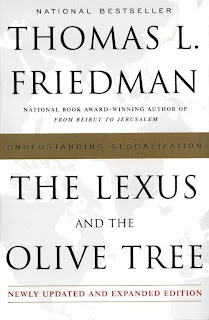2001
 Perhaps the most provocative and disturbing concept that sprang out at me while reading this book was the sentiments of our global neighbors. Friend and foe alike see the United States as the "center of global arrogance". That is, when America projects its huge presence it does not go forth humbly. Reading this book will do nothing to assuage that notion. In fact, I would be first to nominate Friedman as Emperor of the United States of Arrogance.
Perhaps the most provocative and disturbing concept that sprang out at me while reading this book was the sentiments of our global neighbors. Friend and foe alike see the United States as the "center of global arrogance". That is, when America projects its huge presence it does not go forth humbly. Reading this book will do nothing to assuage that notion. In fact, I would be first to nominate Friedman as Emperor of the United States of Arrogance.In short, like most of the decidedly elite circles he travels in he simply knows what's best for everyone. And true to form he offers numerous contradictory assessments of the role government should play in every aspect of human interaction. He also seems to be oblivious to the fact that people around the world define themselves by more than just the size of their portfolios and investments. Amazingly he all but ignores the spiritual aspect of the human condition. The spread of religion could easily be looked upon as the original globalization, yet it doesn't seem to factor in for Mr. Friedman.
In the last section of the book Friedman chooses to lecture the reader rather than present more than one viewpoint on how we'll get to the promised land of Global Utopia. It backfilled the entire book with one contradiction after another. In defining the role the United States should take in leading the world into this new era of globalization Friedman asks us to listen to him think out loud. His idea of a Rapid Change Protection Plan or whatever he calls it makes the New Deal seem trifling by comparison. You might as well call it the Big Deal. He goes on to complain about the Clinton Administration getting off track with its power grab of the America's health care system as though there were nothing wrong with the plan itself but just in the way the debate was framed. In other words, if it had only been justified as necessary for America to integrate into the globalized, interconnected world then it would've been all too obvious. With that argument almost any power grab could be justified. How long before the airline business is declared vital to global integration and needs to be controlled by the government. Then what? How long before all the airlines are controlled by one global authority to ensure successful global integration. One World isn't inevitable; it may not even be possible, but there are a lot of people trying to push us there. Is Friedman one of them? I would have to say yes. He speaks nothing of the American constitution or of national sovereignty. He clearly believes that the free market model of the United States is the inevitable winner of the ideology wars, but he sees it as a global model, fully supporting the World Bank, the IMF, the WTO and a world tribunal. He states that it is time to put down the Green Berets and pick up the blue helmets.
The people standing in front of this speeding train oppose it vehemently but for widely divergent reasons. Violent protests are carried out whenever the WTO meets. Anarchists and environmentalists see consumption driven capitalism as the root of all evil. Big American labor, suppliers of the consumption fodder want protection from the cheap labor in the world's poor countries. Big business wants cheap labor and less government interference, seeing a borderless world as a plus. The markets just want profit.
The walls have come down, the floodgates opened and the world gets a little smaller everyday. If there is one point Friedman makes exceeding well is that the world is changing at a mind numbing pace. Some level of globalization is inevitable and even desirable. I just think we ought to reserve our sovereignty, honor our constitution and keep our guard up. Just like the fifty United States that serve as small experiments of democracy, so too are the nation states of the world small experiments of competing governing strategies. And just like Americans who enjoy the benefit of common standards and practices so too should the rest of the world. We may all be Americans but we are still Texans and Virginians, Minnesotans and Arizonans. The United States is not by any means a perfect nation; but we learn from our mistakes and have the ability to correct injustices. Despite the scorn from our friends and enemies as well as our own schizophrenic self-loathing America still serves as the beacon of freedom and liberty for the rest of the world. Tolerance of all cultures and religions is a must. I cannot imagine a One-World government dominated by the most populous (and murderous) nation on Earth adhering to the principles of freedom of speech and religion. China is as dangerous to freedom and liberty as anything we have ever seen since the birth of our nation. As Paul Harvey says, it is not one world.
2 of 5 stars
CW
No comments:
Post a Comment